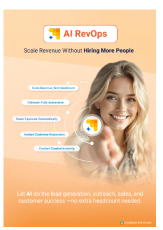In 2025, marketing leaders are increasingly adopting content automation to meet the high demand for personalized and timely content. This approach enhances efficiency, scalability, and personalization, allowing businesses to produce more content with fewer resources. Automation tools streamline content creation, distribution, and performance tracking.
TL;DR
- Marketing leaders are increasingly adopting content automation to meet the high demand for personalized and timely content in 2025.
- Automation enhances efficiency and scalability, allowing small teams to produce more content in less time.
- Companies using automation tools have seen a 30% increase in content output and reduced production time by half.
- Automation enables personalized marketing, boosting sales by up to 20% through data-driven insights.
- AI-driven tools like CloudApper AI RevOps help businesses create engaging content, increasing customer engagement and loyalty.
- Early adopters of content automation gain a competitive edge, with reports showing a 15% increase in market share growth.
- Despite challenges like data privacy, content automation is essential for success in the digital age.
Ready to transform your marketing strategy with content automation? Contact us to learn how CloudApper AI RevOps can empower your business.
Why are marketing leaders doubling down on content automation? The answer lies in the digital marketing landscape of 2025, where the demand for personalized and timely content is at an all-time high. As the world becomes more digitized, businesses face tighter deadlines and larger audiences, making content automation not just a trend but a necessity. Tools like the CloudApper AI Amplifier Agent are stepping in to help marketing teams keep pace—refreshing content instantly, aligning campaigns across channels, and ensuring messages stay relevant without the usual manual workload.
For more information on CloudApper AI RevOps visit our page here.
Efficiency and scalability stand at the forefront of this movement. Content automation allows companies to produce and distribute content across multiple platforms without requiring a large workforce. Previously, crafting blog posts, social media updates, or email campaigns involved hours of manual effort. With automation tools, much of this process is now streamlined. Automation systems can draft content, schedule posts, and track performance in real-time, all from a few simple inputs.
Consider this: A 2024 report from the Content Marketing Institute revealed that companies leveraging automation tools experienced a 30% increase in content output while halving their production time. This scalability enables small teams to accomplish tasks that once required dozens of people. Think back to the early 2000s when content management systems like WordPress revolutionized website creation, making it accessible to non-experts. Today, content automation builds on this foundation with advanced features like auto-tagging and distribution.
A practical example comes from a mid-sized e-commerce company that implemented content automation to generate product descriptions for thousands of items. Instead of manually writing each description, the system utilized inventory data to create tailored text. This approach not only saved time but also ensured consistency across the online store and social media channels. Investing in automation is akin to investing in oneself, freeing up human creativity for more strategic tasks.
When it comes to personalization and customer engagement, content automation excels by making interactions feel bespoke. In 2025, consumers expect content that resonates personally with them. Automation tools analyze data such as browsing history and previous purchases to craft personalized emails and recommendations. This leads to heightened engagement, as users are more inclined to click, read, and purchase.
Research supports this notion. A 2023 study by McKinsey found that personalized marketing could enhance sales by up to 20%. Achieving this level of personalization manually is challenging, especially with email lists numbering in the millions. However, with data-driven tools, it’s a straightforward process.
AI-driven innovation is the backbone of content automation. Tools powered by generative AI can brainstorm ideas, craft articles, and even create videos from text prompts. In 2025, advancements in natural language processing ensure content feels authentic rather than robotic.
Bill Gates once observed, “We always overestimate the change that will occur in the next two years and underestimate the change that will occur in the next ten.” AI in marketing is proving this adage true. From IBM’s Watson winning Jeopardy! in 2011, showcasing AI’s potential, to today’s models generating marketing copy in seconds, the evolution is remarkable. Market trends predict that by 2026, 80% of creative tasks in marketing will involve AI.
CloudApper AI RevOps exemplifies this innovation. Their platform employs AI agents for everything from idea generation to final edits, ensuring high-quality output. Businesses benefit by producing content that resonates with diverse audiences, adapting messages for different cultures and age groups. A tech firm, for instance, utilized CloudApper to create a blog series on industry trends. The AI suggested topics based on search data, drafted initial content, and optimized for SEO, resulting in a 40% traffic increase.
Gaining a competitive edge is another reason leaders are embracing content automation. Early adopters gain an advantage by being faster and smarter. In a saturated market, delivering fresh content daily provides a distinct edge. Consider how Amazon uses automation for product listings and reviews, contributing to their e-commerce dominance.
A customer story further illustrates this point. A small health sector business featured in CloudApper’s resources used AI RevOps to automate social media posts. Previously invisible online, they now maintain consistent visibility, outpacing larger competitors. Read Content Marketing on Autopilot: How Small Businesses Can Stay Visible with AI Agents to get a detailed picture of how this approach helped them gain 50% more followers in six months. This competitive win demonstrates how automation levels the playing field.
Looking ahead, content automation will continue to evolve, though challenges persist. Trends indicate increased integration with virtual reality for immersive content and enhanced ethical AI to avoid biases. However, issues such as data privacy and content authenticity require attention. The EU’s AI Act of 2024 set standards for transparent AI use, which will influence 2025 and beyond.
Speculating about the future, by 2030, automation could handle 90% of routine content tasks, according to IDC forecasts. Yet ethical considerations remain crucial, ensuring AI doesn’t propagate misinformation. Marketing leaders must balance innovation with responsibility.
In summary, content automation is revolutionizing marketing by enhancing efficiency, enabling personalization, fostering AI innovation, providing competitive advantages, and paving the way for future growth. Marketing leaders wisely invest in it to address the demand for scalable, engaging content in the digital age. Tools like CloudApper AI Amplifier Agent make this accessible, empowering businesses of all sizes to thrive. By understanding its benefits and navigating challenges, companies can stay ahead. Whether a small startup or a large enterprise, embracing content automation is not just an option but essential for success in 2025 and beyond.

Scale Revenue Without Hiring More People
Meet the AI Team Behind Your Revenue Growth
CloudApper’s AI Revenue Operations Team helps you scale without the cost and complexity of hiring.
Learn more | Download BrochureFAQ
- What is content automation in digital marketing? Content automation refers to the use of tools and technology to streamline the creation, distribution, and optimization of digital content. This includes leveraging AI for drafting content, scheduling posts, and personalizing customer engagement. For more insights on AI-driven innovation, check out our article on Boosting Revenue Efficiency with AI-Driven Solutions.
- How can small businesses benefit from content automation? Small businesses can significantly benefit from automation by increasing efficiency and market visibility. Automation tools enable them to manage tasks that typically require a larger workforce. For instance, automating social media posts can help maintain consistent brand visibility, as discussed in Automate Customer Communications and Reduce Sales Message Drop-Off.
- How does personalization work with content automation? Personalization in content automation utilizes data analysis such as browsing history or purchase behavior to craft messages that resonate with individual consumers. This tailored approach significantly enhances consumer engagement and sales.
- What challenges exist with implementing content automation? While content automation offers many benefits, challenges such as data privacy, content authenticity, and ethical AI use need to be addressed. Ensuring transparency and maintaining a balance between innovation and responsibility are key to overcoming these challenges. Consider exploring AI-powered solutions further by visiting AI-Powered Automation, Security, and Integration in Revenue Ops.
What is CloudApper AI Platform?
CloudApper AI is an advanced platform that enables organizations to integrate AI into their existing enterprise systems effortlessly, without the need for technical expertise, costly development, or upgrading the underlying infrastructure. By transforming legacy systems into AI-capable solutions, CloudApper allows companies to harness the power of Generative AI quickly and efficiently. This approach has been successfully implemented with leading systems like UKG, Workday, Oracle, Paradox, Amazon AWS Bedrock and can be applied across various industries, helping businesses enhance productivity, automate processes, and gain deeper insights without the usual complexities. With CloudApper AI, you can start experiencing the transformative benefits of AI today. Learn More
AI RevOps Agent
Scale Revenue Without Hiring More People
Download Brochure


Amplifier Agent
Keeps Your Brand Visible With Articles & Social Media Content That Connects.
Learn More
Outreach Agent
Launches Email & SMS Campaigns That Reach Out on Time and Actually Convert.
Learn More


- Works with
Similar Posts

The Next Generation of Email Automation Tools: Why the AI…

Speed Up SaaS Queries with Real-Time FAQ Tools for Busy…















